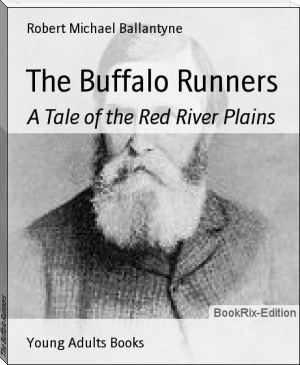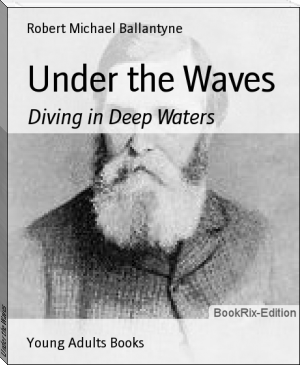The Buffalo Runners - Robert Michael Ballantyne (read aloud .txt) 📗

- Author: Robert Michael Ballantyne
Book online «The Buffalo Runners - Robert Michael Ballantyne (read aloud .txt) 📗». Author Robert Michael Ballantyne
By the time he had passed over the short distance, he was so much exhausted that he fell at the foot of the bank almost in a swoon.
Evidently the wolf imagined that its time had now come, for it sneaked out of the wood when the hunter fell, and began cautiously to advance. But Dan saw this, and, making a desperate effort, arose to a sitting posture, leaned his back against the bank, and placed his gun across his knees.
Seeing this, the wolf sat down on its haunches, and coolly began to bide its time.
"Ha! you brute!" muttered Dan, "I could easily stop your mischief if my strength wasn't all gone. As it is, I dare not give you my last shot till you are so close that you can look down the barrel o' my gun."
From this point a watch of endurance began on both sides--the brute, of course, unaware of the deadly weapon which its intended victim held, and the man fully aware of the fact that if he should venture to lie down and sleep, his doom would be sealed.
It is impossible for any one who has not had trial of similar experiences to imagine the rush of thought and feeling that passed through the brain and breast of Dan Davidson during the long dreary hours of that terrible day. Sometimes he fell into a half-dreamy condition, in which his mind leaped over forests and ocean to bonnie Scotland, where his days of childhood were spent in glorious revelry on her sunny banks and braes. At other times the memory of school-days came strong upon him, when play and lessons, and palmies were all the cares he had; or thoughts of Sabbaths spent with his mother--now in the church, now in the fields, or at the cottage door learning Bible stories and hearing words of wisdom and the story of the crucified One from her lips. Then the scene would change, and he was crossing the stormy ocean, or fighting with Red-skins, or thundering after the buffalo on the wide prairies. But through all the varied fabric of his thoughts there ran two distinct threads, one golden, the other black. The first we need hardly say was Elspie McKay; the second was that awful wolf which sat there glaring at him with a hang-dog expression, with the red tongue hanging out of its mouth, and from which he never for a moment allowed his eyes to wander.
As evening began to draw on, the situation became terrible, for Dan felt that the little strength he had left was fast sinking. The efforts by which he had succeeded in rousing himself in the earlier parts of the day were failing of their effect. Then a strange and sudden change occurred, for, while he knew that the end of the trial was rapidly approaching, he began to experience a feeling of indifference--the result, no doubt, of excessive weariness--and almost a wish that all was over. Nevertheless, whenever that wolf moved, or changed its position ever so little, the instinct of self-preservation returned in full force, and Dan, pulling himself together, prepared to defend himself desperately to the last gasp.
While the two were thus glaring at each other, Dan was startled and thoroughly aroused from his irresistible lethargy by a loud report.
Next moment he saw the wolf extended dead upon the plain.
CHAPTER TWENTY FIVE.
ADVENTURES OF FERGUS AND HIS FRIENDS.
In order to account for the sudden death recorded in the last chapter, we must turn aside to follow for a little the fortunes of Fergus McKay.
It will be remembered that the vigorous Highlander, after overturning the Indian canoe and running his own canoe on shore, was seized by the neck, while in the act of reaching forward to grasp his gun, and captured.
Now, Fergus was of an unusually knowing and wily nature. He possessed what some would call more than his share of readiness in action and sagacity in counsel, though his ordinary reticence and sluggishness of manner concealed those qualities to some extent.
Being endued, also, with more than the average allowance of that bodily strength for which his countrymen are famous, his first impulse was to exert his powers and show fight, but he had been taken suddenly at a disadvantage and thrown on his back into the bottom of the canoe, and at least three pair of very muscular hands grasped his throat and other parts of his person. That they were strong hands he felt; that they belonged to big strong savages he had every reason to believe--though it was too dark to see--and that scalping-knives and tomahawks were handy to them he knew to be highly probable. He therefore promptly made up his mind as to his course of action, and at once began to play his part. Making a very feeble resistance--just enough, in short, to deceive--he begged for mercy in soft, rather tremulous and very abject tones. True, his language was English--at least that sort of English to which the mountaineers of Scotland are addicted--but he trusted to the tone and manner of his speech, not to the sense, which Saulteaux, he knew, could not be expected to understand.
"Oh! then, don't be hard on me. Don't kill me, goot shentlemen," he whined. "It iss a poor worthless thing I am--whatever!"
These remarks, and a few similar appeals for mercy, were accompanied with many dismal groans, as his captors were dragging him up the bank of the stream. Pausing for a moment, one of them produced a cord, with which they proceeded to bind their cowardly and unresisting prisoner.
Whether the Indians were deceived by their victim's tones and manner, and the soft condition of his carefully relaxed muscles, we cannot tell, but it seemed as if such were the case, for some of the brief remarks made by his captors had in them a smack of undisguised contempt, and when the cord was being put round his arms he felt that the grip of his captors was slightly relaxed.
Now or never was his chance! Hurling the men on either side of him right and left, he delivered two random blows in front, one of which happily took effect on a savage chest, the other on a savage nose, and cleared the way in that direction. With a bound like that of one of his own mountain deer, he cleared the bank, and plunged into the river.
In ordinary circumstances an attempt of this kind would have been worse than useless, for the Indians would not only have jumped into their canoes and overtaken the fugitive, but some of them would have run down the bank of the stream to prevent a landing. Some such attempt was indeed made on the present occasion, but the intense darkness was in favour of Fergus, and the searching canoes only ran into each other, while the searchers on land were still more at a disadvantage.
Now, Fergus McKay was as much at home in water as an otter or a musk-rat. Indeed he had been known among his playmates in the old country as the "Water-rat." When, therefore, he plunged into the river, as described, he took care to hold his breath as if for a long dive, and drifted with the current a considerable distance as motionless as a dead man. The Indians listened intently, of course; for his coming to the surface; for the breathing, and, it might be, for the splashing that would be natural after such a leap, but no breathing or splashing met their ears, for when Fergus put up his head, far down the stream, he only let out his nose and mouth for a gentle inspiration, and sank again.
"It iss circumventin' you at your own trade, fightin' you wi' your own claymore, that I will be doin'," he thought, as he rose a second time, and swam softly with the stream.
Fergus had the advantage of being well acquainted with the river in which he was swimming, as well as with the lands in its neighbourhood, and he knew that there was a certain bend in the stream which it would take the canoe of Okematan a considerable time to traverse. By cutting across a narrow neck of land there was, therefore, a possibility of his intercepting the canoe.
The Saulteaux, of course, might have also taken advantage of this circumstance, but they could have done so only on foot, and they knew that without canoes they could not arrest the progress of the fugitives.
Reaching the spot where he wished to land, by intuition almost, the Highlander soon found himself on the bank, squeezed the water out of his garments, and set off as quickly as he dared in such darkness. By good fortune he happened to cross a hunter's track or path--like a sheep-run--with which he was familiar, and, by following it, was able to advance much more rapidly. In a short time he again came out on the left bank of the river. There he sat down on a boulder to listen. Profound was his attention to every sound--as profound, almost, as his anxiety, for he knew that if the canoe should have already passed he would be obliged to make his way back to the Settlement on foot by a straight course, which meant a slow, toilsome march, scrambling through pathless woods, wading morasses, and swimming across rivers.
He had been seated thus for about half-an-hour, and in his impatience was giving way to despondency, when the plash of water smote upon his ear. Cocking the said ear attentively, he was rewarded with another smite, and, in a few minutes, distinctly heard the sound of paddles.
He put his hands to his mouth forthwith, and uttered a peculiar cry.
Instantly the sound of the paddles ceased as Archie Sinclair, looking over his shoulder, said--
"Did you hear that, Oke?"
Before Oke could reply, the cry was repeated.
"It is Fer-gus," said the Indian, answering to the cry, and steering in the direction whence it came. "Are you sure, Oke?"
"Okematan never speaks till he is sure--waugh!"
"H'm! I'm not so sure o' _that_," muttered the boy to himself.
A few seconds put the matter at rest, for the voice of the Highlander was heard, as they cautiously drew near, saying--
"Iss it _you_?"
"I think it is!" replied Archie; "why, man, where are you? I can see nothing."
"Wow! man, but I am gled," said Fergus; "just follow your nose, Archie, an' you'll be all right."
Another moment, and the canoe was checked by Fergus, who had stepped into the water to prevent its being injured against the stones.
"You better gie me the paddle, Archie, an' sit beside Little Bill. It iss tired o' paddlin' you will be by now."
"But where is Dan?" asked Archie as





Comments (0)